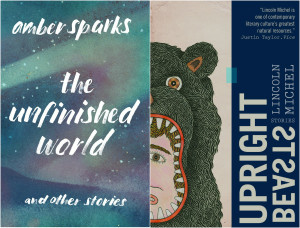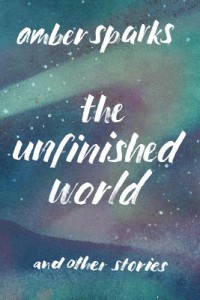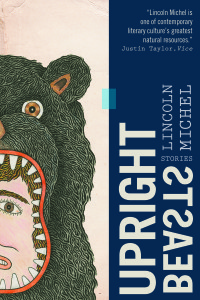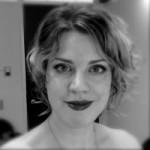 We’ve have had the pleasure of reading the work of Amber Sparks and Lincoln Michel for a number of years, and we’ve published work by each of them as web exclusives in the not-so-distant past. This fall, Michel published his debut collection of short fiction, Upright Beasts, and Sparks’s next book, The Unfinished World, will be published in January. We recently emailed both authors to ask about their new books, their writerly obsessions, the year in publishing, and the best things they’ve read recently.
We’ve have had the pleasure of reading the work of Amber Sparks and Lincoln Michel for a number of years, and we’ve published work by each of them as web exclusives in the not-so-distant past. This fall, Michel published his debut collection of short fiction, Upright Beasts, and Sparks’s next book, The Unfinished World, will be published in January. We recently emailed both authors to ask about their new books, their writerly obsessions, the year in publishing, and the best things they’ve read recently.
Nate Brown: It’s fair to say that neither of you write naturalistic fiction, but it’s hard to pinpoint the mode or genre(s) in which you’re working. Not that one needs to slap a label on your work, of course, but I’m curious to know what you say to someone who asks. How do you best describe your work to other people?
Lincoln Michel: I’ve been thinking about this question a lot recently, because I very much believe that I’m writing in a lineage—or combination of lineages—yet I think that our modern critical language doesn’t really know what to do with non-realist writing. Most MFA students could give you a good rundown of the differences between minimalism, maximalism, dirty realism, autofiction, and so on. But when it comes to talking about writers who are doing non-realism, it seems like we just toss up our hands and throw it all in one big pot. So everything is just “magical realism” regardless of technique, style, tradition, or intent. Or it’s all “slipstream” or maybe “fabulist.” I think that those broad categories contain a huge range of work, and it would be useful to have some more terminology to discuss them.
I’m ranting a bit, sorry. I’ve been very influenced by writers whose work is steeped in the surreal, the uncanny, and the fantastic. Franz Kafka, Kobo Abe, Shirley Jackson, and the like. You could call them “weird fiction” perhaps. I also think there is a type of hallucinatory realism that produces a similar effect in the reader that I’m looking to create—Denis Johnson’s Jesus’ Son, Joy Williams, Diane Williams—that greatly influenced me stylistically. I’m also really fond of authors who have a sense of serious play in their work such as Italo Calvino and Donald Barthelme. I don’t think I write like those authors on a sentence level, but I try to keep their spirit of joyful experimentation in my work.
Your question of genre though brings up yet another thing I’ve been thinking about recently, which is that I’ve started to notice a movement of what I’d call “genre-omnivore” writers. I’m thinking Kelly Link, Brian Evenson, Karen Russell, and similar writers. It isn’t just that they “genre-bend,” but that they write seriously in different genres. A science-fiction story will be next to a horror story that is next to a postmodern fable. This is very different than merely being “slipstream” or “magical realist” stories that don’t fit neatly into established genres, but are all of a piece. This was something I attempted in Upright Beasts, which places stories of Southern realism, cosmic horror, fabulism, and such side by side.
Amber Sparks: Oh, man. This is always the hardest question. I guess it really depends on who I’m talking to and what I perceive their perspective to be. Like, if I’m talking to non-writers, I usually just say literary fiction—or maybe magic realism. I have to be careful not to say sci-fi or fantasy even though to me a lot of the stories feel like that, but to non-writers that usually signifies hard science-fiction or fantasy, strict genre stuff. If I’m talking to writers, I might get fancier and say something about fabulism or slipstream. Or if it’s someone at my work I’ll say “short stories” and smile and hope they don’t ask any more questions.
NB: Speaking of work, Amber, I know that in addition to being a writer, you’ve spent your career working on behalf of union employees. So many of your stories also include work or working environments, and I’m curious to know if (and how) your work life enters your creative work?
 AS: I don’t tend to write much about the kind of workers that I represent, and that’s partly intentional (I don’t want to cause any issues at work or piss anyone off who thinks I might be writing about them). But I do write about work ALL THE TIME. Anyone who’s been friends with me for a hot minute knows how often I go on and on and on about writing about work. I believe that if your adult character does not have a job there had better be a really good reason for it.
AS: I don’t tend to write much about the kind of workers that I represent, and that’s partly intentional (I don’t want to cause any issues at work or piss anyone off who thinks I might be writing about them). But I do write about work ALL THE TIME. Anyone who’s been friends with me for a hot minute knows how often I go on and on and on about writing about work. I believe that if your adult character does not have a job there had better be a really good reason for it.
Regardless of whether you’re writing realist or wildly experimental fiction. I mean, for the vast majority of people, and that includes aliens and fairy tale characters, work is an enormous part of your life whether you love it, hate it, or tolerate it. I’ve always been engaged on the social justice side of fighting for workers, and that certainly translates into a certain amount of writing I do about the less glamorous jobs, too. But that’s also why I do what I do for a living—it’s very hard for me to separate the intent from the action—the job from the writing about the jobs. (Also: not only do your characters need to have jobs, but they can’t all be writers, struggling or successful. Please no more stories about writers writing in coffee shops, dear Jesus.)
NB: Amber, your new collection, The Unfinished World, will be published in January, and Lincoln, yours, Upright Beasts, was just out in October. Can you each talk a bit about how the collections came together and what working with your publisher was like? What’re the oldest stories included and which are the most recent?
AS: I’m probably the only person in history whose editor read my novel and said, hey, this is great but can you make it a short story and send me a book of those? (Does it sound like my editor is super awesome? Because, yes, she is.) As it happened, I had a book of short stories that I was also shopping around, and as it also happened I have a sick love of slashing and burning my own stuff, so it was really fun to turn the novel into a novella (which actually works so much better) and to figure out, with my editor, Katie Adams at Liveright, which stories from the manuscript to keep and which to toss. She has an amazing feel for how to order and put together a collection—which stories worked and which stories just didn’t quite fit. If this book is good, she gets so much of the credit for that—or she had better.
I’m actually not sure just thinking about it—most of the stories are newer, within the last couple of years. I would say there are a few shorter pieces that are older than that—but most were written around the same time-ish, after my first collection came out in late 2012.
 LM: Upright Beats is my first book, and it was culled from everything I’ve written in the past decade. I’d published or completed about sixty stories, many very short, so my process was largely one of curation. Trying to figure out what stories worked the best together and in what order. As I said in the last answer, I ended up going all-in on a “genre-omnivorous” collection, but I went through a lot of different tables of contents with more narrow focuses before getting to that.
LM: Upright Beats is my first book, and it was culled from everything I’ve written in the past decade. I’d published or completed about sixty stories, many very short, so my process was largely one of curation. Trying to figure out what stories worked the best together and in what order. As I said in the last answer, I ended up going all-in on a “genre-omnivorous” collection, but I went through a lot of different tables of contents with more narrow focuses before getting to that.
I think most of the stories were written between 2009 and 2013, but some are earlier than that and the earliest drafts of “The River Trick” date back to my senior year of college (’04-’05). Working with Coffee House has been fantastic. I really admire the work they publish, and they work really hard for their authors. An advantage of a small press is that they are much more focused on a handful of titles, whereas you can sometimes get lost in a big press imprint.
NB: Lincoln, you recently wrote a piece for Buzzfeed in which you laid out advice for submitting work to literary magazines. I really enjoyed it (and wished I’d had it on hand about a decade ago!), but I found my self wondering: in the years that you’ve been publishing, do you have any regrets? Are there pitfalls others should look to avoid as they seek to write and publish work?
LM: I’m full of regrets for just about everything in life. On the other hand, I’d probably cling to those regrets with my claws if you tried to drag them away. I dunno, it’s a hard question. I often chastise myself for not being more focused in my story writing… but then I wouldn’t have written the eclectic book I did. And I often regret not finishing some of the early novels I started… but maybe finishing all of these stories and abandoning those early novels will make my future ones stronger. You really don’t know where any paths would have lead you. Certainly I regret not writing more and dicking around on the internet less. But to the more specific question of my submitting history and publication history, I don’t think I really have too many. Although I’ve published a lot, I don’t think I ever published bad work and flooded the lit mag world with everything I wrote. I’ve seen a lot of writers do that and I think it can really backfire. As I think I said in that essay, a couple great stories that people talk about is worth a lot more than dozens of okay stories that everyone forgets or ignores.
NB: There’s a certain finality to publishing a book, right? I’m wondering what it feel like to look back on the work now. How do you each feel about your earlier work and how does that work compare to what you’re working on now?
LM: There is a finality, although in many ways it is a finality in other people’s eyes. Critics and readers take my work much more seriously now that it is in book form, which is fantastic. I like to be taken seriously! But I wrote and published most of these stories years ago, so I already made my peace with them and sent them out on the ice floe to die long ago.
I’ve been working mainly on a couple novel ideas this year, so that’s different. The novel I just finished a draft of is pretty stylistically different than my stories, actually. The other projects I’m working on feel like an extension of the work in Upright Beasts, just in longer form.
AS: I feel great about the stories in the collection—probably because it’s pretty recent work, and I’ve gone back and reworked and edited so many of the stories recently. I wince at some of the stories in my first collection, a little—not that they’re bad but I feel like I’m trying now for more of an elegance, a sense of ease with the stories I write (even though of course they didn’t actually come easily). And some of the earliest work feels like I worked for it—it reads like that. It’s not a terrible thing, but I feel much better now about how to round the corners off and polish a piece, to wipe the sweat and blood and tears off of it. I know that’s the opposite of what some people like but I want my work sanitized.
Lincoln, you and I are both I think primarily short story writers, yes? At least I think that’s how other people would describe us. Joy Williams has this thing she says about short stories, and I’m paraphrasing, that they shouldn’t want to be your friend the way novels do. So now that you’re almost finished with one novel and working on a second, what do you think about that idea? Have you found it to be true?
 LM: I suppose I’m a de facto short story writer since my only book is short stories, but I’ve increasingly found myself drawn towards writing novels. (Even my short stories have increasingly increased in length. I used to write primarily flash fiction.) Anyway, I understand what Williams—who is one of my favorite writers—is saying. I think the exact quote is “A novel wants to befriend you, a short story almost never.” Short stories are quick little stabs in your abdomen. They can be distant and obscure to the reader in a way that novels, by virtue of their length, can’t. If you are sticking with a story for 200-2,000 pages, perhaps you expect that book to be a friend. That said, many of my favorite novels are pretty cold, distant beasts (e.g., Blood Meridian or the novels of Thomas Bernhard), so there are exceptions to everything. I do think that stories allow you to be more extreme—whether in voice, structure, style, or character—than novels do. A reader is more will to go with something out there for 5 pages than 500.
LM: I suppose I’m a de facto short story writer since my only book is short stories, but I’ve increasingly found myself drawn towards writing novels. (Even my short stories have increasingly increased in length. I used to write primarily flash fiction.) Anyway, I understand what Williams—who is one of my favorite writers—is saying. I think the exact quote is “A novel wants to befriend you, a short story almost never.” Short stories are quick little stabs in your abdomen. They can be distant and obscure to the reader in a way that novels, by virtue of their length, can’t. If you are sticking with a story for 200-2,000 pages, perhaps you expect that book to be a friend. That said, many of my favorite novels are pretty cold, distant beasts (e.g., Blood Meridian or the novels of Thomas Bernhard), so there are exceptions to everything. I do think that stories allow you to be more extreme—whether in voice, structure, style, or character—than novels do. A reader is more will to go with something out there for 5 pages than 500.
Amber, one thing that’s interesting about your stories is that you tend to come at a classic scenario from an unexpected angle. Your first story is about astronauts in space, but the focus is a janitor who doesn’t interact with the other astronauts. Or the story that I published in Gigantic Worlds, “Thirteen Ways of Destroying a Painting,” features a time traveler. But instead of going back to kill baby Hitler ala Jeb Bush or stop a deadly virus, she is destroying a painting. Is that something you are seeking to do when you sit down to write a story?
AS: I suppose there are two reasons for that, or two I can identify. The first is that I’ve always been more interested in the marginalia, in the periphery of the stories we tell. And the second is I’ve always been more interested in ways of telling than in the telling itself—so the stories have a way of driving to the margins on their own. I’ll know for a very long time, often years, that I want to write a story about X—usually something that’s happened in history, or maybe a concept, or a person or place. And then I roll that idea around in my head for a while, let it marinate, and try to figure out how that particular story is going to get told. One of the pieces in the book, about the murderous Benders in the Old West, I sat with for about four years before I figured out that it needed to come from the Bender nobody really knows anything about—the mute little boy. Put it another way: I think my stories actually work the same way as peak-era Simpsons episodes. They’re these Rube Goldberg-ian contraptions that start in one improbable place and end up doing something and being about something else entirely. I’m not sure why, but it’s how I’m able to tell the stories I need to.
NB: What are each of you writing now?
AS: I’m working on a novel—isn’t everyone? I have two failed novels behind me, so maybe the third time’s the charm, as the cliché goes! My ambition keeps getting smaller or maybe more claustrophobic: the first novel was retelling of Odysseus (because no one ever did that, right?) and the second spanned just a dozen centuries or so. The third one, the scope is—well, a little more limited. Tightly focused, is a better way to say it.
LM: Finishing up DOOM MOOD—which you published an excerpt from earlier this year!—and working on a couple other projects: a dystopian science-fiction novel about baseball, a weird fantasy novel about teenage girls in a haunted neighborhood, and a cosmic horror graphic novel about Werner Herzog working as a park ranger.
Amber, your last book was a collaboration with the writer Robert Kloss and the artist Matt Kish. How different is the writing process for you when you are collaborating on a text?
 AS: Writing the book with Rob (Matt worked in the illustrations later, so it wasn’t a collaboration in quite the same way) was really fun and quite a bit different than writing solo. We basically took turns writing sections of the book, and since it takes place in different eras, we decided loosely on what eras we’d each cover and went nuts from there. And then for instance, when I’d written my piece about Egypt in the ’20s, I gave it to Rob and he rewrote the hell out of it, make it his own. Then he gave it back to me, and I rewrote the hell out of that, and then we both made smaller edits and that’s what went in the book. And vice versa for his own pieces. It was a great and unusual thing to be given permission by a writer you admire to mess around with their stuff—it’s a bit of a power trip. And it was also a great exercise in letting go of your ego completely, because you had to. The loose rules we had said you couldn’t be all “oh but that’s my word,” or “that’s my POV” or whatever—you had to be willing to lose the things that you hold onto the most, which made for some fascinating writing that neither of us could entirely claim. Ha, it was probably a little like what working with Gordon Lish is like, perhaps?
AS: Writing the book with Rob (Matt worked in the illustrations later, so it wasn’t a collaboration in quite the same way) was really fun and quite a bit different than writing solo. We basically took turns writing sections of the book, and since it takes place in different eras, we decided loosely on what eras we’d each cover and went nuts from there. And then for instance, when I’d written my piece about Egypt in the ’20s, I gave it to Rob and he rewrote the hell out of it, make it his own. Then he gave it back to me, and I rewrote the hell out of that, and then we both made smaller edits and that’s what went in the book. And vice versa for his own pieces. It was a great and unusual thing to be given permission by a writer you admire to mess around with their stuff—it’s a bit of a power trip. And it was also a great exercise in letting go of your ego completely, because you had to. The loose rules we had said you couldn’t be all “oh but that’s my word,” or “that’s my POV” or whatever—you had to be willing to lose the things that you hold onto the most, which made for some fascinating writing that neither of us could entirely claim. Ha, it was probably a little like what working with Gordon Lish is like, perhaps?
Actually, the coolest thing is how Matt Kish made the illustrations such an integral part of the book that we couldn’t imagine the text without them. They absolutely transformed the text without us changing a word. I would love to do more collaborations with graphic artists and illustrators, because I’m a very visual person and I think text/image collabs are some of the most beautiful and interesting work out there.
Lincoln, a purely selfish question for my own curiosity: when and where did you first get into monsters, and when or where did you first understand that writing about monsters (civilized and otherwise) could be an elevated, literary pursuit?
LM: I don’t really think of Upright Beasts as overly concerned with them, but I do like monsters and there are a few in there to be sure. (I also like drawing famous authors as monsters.) I never thought of monsters as un-literary though, perhaps because the earliest stories I ever loved where the myths of various cultures, especially the Greeks whose stories are filled with gods and monsters. The classic Western texts of the Greeks or the Romans or even many of Shakespeare’s plays have ghosts and witches and monsters of all sorts. So do the classic texts of other cultures, of course, but I read less of them growing up. And then, in addition to the great science-fiction/fantasy works, you have John Gardner’s Grendel, Bulgakov’s The Master and Margarita, and any other number of “elevated, literary” books with monsters. The idea that such things can’t be the subject of literary work is a very recent one, a little blip in the timeline of literature.
NB: That’s an interesting point, and I wonder if shifting ideas about what makes “good” literature exist in tandem with broader conversations about how the publishing industry is changing. I feel like, just a couple of years ago, literary controversies centered on issues of plagiarism or on (real or perceived) slights between writers. More recently though, big, substantive conversations about race, gender, exclusiveness, sexism, classism, and genre have really come to the fore, and I think readers and publishers are responding and taking part in those conversations, if slowly. What do you hope publishing looks like in the next five years? How about the next twenty-five?
AS: I hope publishing is one thousand percent more diverse. Gender, race, economics—along the whole spectrum, I hope we see many more stories being told that aren’t being told now. I think you’re right—we’re starting on the painful but exciting path to that process. Change is hard but it’s going to be so worth it, I think even in just a few years. I hope even next year.
LM: I think that literary world has made some important strides in diversity on the writing side. There was an article this week about how the most prominent year-end lists had very few white men this year, and far more international writers, writers of color, and women. So that’s great. However, the “back of house” side of publishing (editors, publishers, publicists, even critics) is still about as white as you can imagine. A recent PW survey said the industry was 89% white still. So there is a long long way to go there. And it is important, because when all of the publishing industry is made of middle to upper class white men and women, they naturally gravitate toward that kind of work that they have been trained to like and often dismiss vital work that they think—normally incorrectly!—won’t find an audience.
I’m more hopefully about the genre side of things. I think we have more or less torn down the genre walls and realized that there is really amazing work written in all genres. There is plenty of crappy work too, but I think we’re at the point where we realize that Samuel Delany can be taught next to George Saunders and Ursula K. Le Guin can be studied alongside Flannery O’Connor. There are genre snobs left on both “sides,” but their voices are increasingly irrelevant.
NB: I can’t really hold an interview with any writer without asking them what they’re reading. So, um, what’re you reading? What’s good? What’s terrible?
AS: Right now I’m actually reading a galley of Gabriel Blackwell’s Madeleine E, which is film criticism, history, memoir—a whole amazing thing centered (kind of) on Hitchcock’s Vertigo. It’s indescribable and wonderful and I can’t wait for it to come out so everyone can read it. I try to avoid things that are terrible as a general rule of thumb, and I’m pretty good at it. I guess I can’t stop myself from reading the news, and that’s more or less terrible every day.
LM: I didn’t get to read nearly as much as I’d like to this year. Putting out a book is a lot of work! I did revisit two of my favorite authors—Kobo Abe and Italo Calvino—this year, and found I loved them just as much. Most recently, I read Mishima’s Confessions of a Mask and Ursula K. Le Guin’s Earthsea books. Not my favorite works from either author, but they were good. I’m not opposed to some trash talking, but honestly, I didn’t read more than twenty pages of any book I didn’t like this year. I didn’t have the time.
Lincoln Michel is the author of Upright Beasts. He is the editor-in-chief of electricliterature.com and the co-editor of Gigantic Worlds, an anthology of science flash fiction. His work appears in Granta, Vice, The Believer, Tin House, the Pushcart Prize anthology, and elsewhere. You can find him online at lincolnmichel.com and @thelincoln.
Amber Sparks is the author of the short story collection May We Shed These Human Bodies, and the co-author (with Robert Kloss and illustrator Matt Kish) of the hybrid novel The Desert Places. Her new collection, The Unfinished World, will be published in January by Liveright Books. You can find her most days @ambernoelle and some days at ambernoellesparks.com.